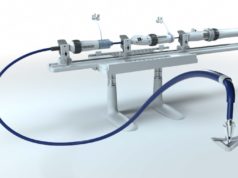 The second clinical case using Micro Interventional Devices’ proprietary MIA (minimally invasive annuloplasty) technology for percutaneous mitral and tricuspid repair has been performed on the second patient enrolled in the company’s STTAR clinical study.
The second clinical case using Micro Interventional Devices’ proprietary MIA (minimally invasive annuloplasty) technology for percutaneous mitral and tricuspid repair has been performed on the second patient enrolled in the company’s STTAR clinical study.
STTAR, the Study of Transcatheter Tricuspid Annular Repair, is a multicentre safety and performance study being conducted in Europe.
The patient was a 60-year-old man with severe mitral and moderate tricuspid regurgitation. Eight MIA implants were deployed into the patient’s tricuspid annulus in a 270-degree partial ring pattern concomitant with mitral valve repair. The MIA deployments took 14 minutes to complete and resulted in a 48% acute reduction in annular area. The annular reduction is achieved without sutures or other intervention.
The first two procedures were performed by Kestutis Rucinskas, chief of Cardiac Surgery, and Audrius Aidietis, chief of Cardiology and Angiology, at the Vilnius University Hospital Santariskiu Clinic in Vilnius, Lithuania. As with the first case, there were no intraoperative complications or adverse events observed or reported and post-procedural patient recovery has been uneventful. The first patient, treated on December 6th, 2016, has now been followed to 30 days with no observed or reported adverse events. The reduction in annular area observed at hospital discharge has been maintained at 30-day follow-up.
“We successfully deployed eight MIA implants into the patient’s tricuspid annulus. It was impressive that the clinicians only took 14 minutes to deploy the technology,” Willard Hennemann, MID’s chief science officer, commented. “Prior to deployment of the MIA implants the intraoperative saline injection leak test demonstrated a lack of leaflet coaptation. After deployment of the MIA implants the saline injection leak test revealed full leaflet coaptation and a competent valve. The acute 48% reduction in valve area observed was comparable to that achieved with the current surgical standard of care. This reduction was maintained at hospital discharge.”
The MIA implant is made from the proprietary PolyCor anchors bonded to the proprietary, self-tensioning, implantable elastomer called MyoLast. According to a press release, this is the world’s first low mass polymeric implant designed specifically to comply with normal physiological valvular function. The MIA implant is designed to plicate and comply with cardiac soft-tissue once deployed.










